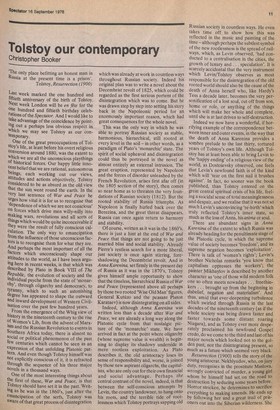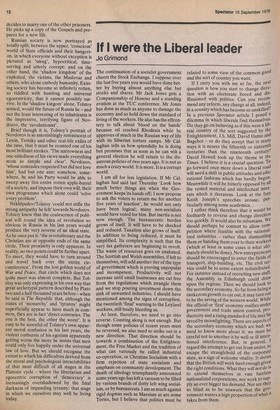Tolstoy our contemporary
Christopher Booker
The only place befitting an honest man in Russia at the present time is a prison'. Tolstoy, Resurrection (1900) Last week marked the one hundred and fiftieth anniversary of the birth of Tolstoy. Next week London will be en fête for the one hundred and fiftieth birthday celebrations of the Spectator. And I would like to take advantage of the coincidence by pointing out a perhaps less obvious respect in Which we may see Tolstoy as our con temporary.
One of the great preoccupations of Tolstoy's life, at least before his overt religious conversion around 1880, was the extent to Which we are all the unconscious playthings Of historical forces. Our happy little innocent belief that we are rational, autonomous beings, each working out our views, attitudes and actions objectively, Tolstoy considered to be as absurd as the old view that the sun went round the earth. In the very last sentence of War and Peace he urges how vital it is for us to recognise that dependence of which we are not conscious' on forces which drive men willy-nilly into making wars, revolutions and all sorts of things which would be quite inconceivable if they were the result of fully conscious calculation. The only way to emancipation from the influence of those unconscious factors is to recognise them for what they are. And perhaps the most important of all the factors which unconsciously shape our attitudes to the world, as I have been arguing here in recent weeks, is that which was described by Plato in Book VIII of The epublic, the evolution of society and the individual psyche from the state of 'monarchy', through oligarchy and democracy, to tyranny, which to such an astonishing degree has appeared to shape the outward and inward development of Western Civilisation over the past few hundred years. From the emergence of the Whig view of history in the nineteenth century to the rise 9f Women's Lib, from the advent of Marxism and the Russian Revolution to events in Southern Africa today, there is almost no social or political phenomenon of the past few centuries which cannot be seen as an expression of that unfolding Platonic pattern. And even though Tolstoy himself was not explicitly conscious of it, it is refracted through the sequence of his three major novels in a thousand ways. One of the most interesting things about the first of these, War and Peace, is that T. olstoy should have set it in the past. Writing as he was in the 1860's, just afterthe emancipation of the serfs, Tolstoy was aware of that great process of disintegration which was already at work in countless ways throughout Russian society. Indeed his original plan was to write a novel about the Decembrist revolt of 1825, which could be regarded as the first serious portent of the disintegration which was to come. But he was drawn step by step into setting his story back in the Napoleonic period for an enormously important reason, which had great consequences for the whole novel.
This was the only way in which he was able to portrayRussian society as stable, harmonious, hierarchical, still rooted at every level in the soil — in other words, as a paradigm of Plato's 'monarchic' state. The spirit of social upheaval and disintegration could thus be portrayed in the novel as almost entirely an external intrusion. The great eruption, represented by Napoleon and the forces of disorder unleashed by the French Revolution, arises first afar off (in the 1805 section of the story), then comes so near home as to threaten the very foundations of Russian society (1812). But the rooted stability of Russia triumphs. As Napoleon is finally hurled back over the Berezina, and the great threat disappears, Russia can once again return to harmony and stability.
Of course, written as it was in the 1860's, there is just a hint at the end of War and Peace that things are not going to be just married bliss and social stability. Already Pierre's restless search for a more liberal, just society is once again stirring, foreshadowing the Decembrist revolt. And in Anna Karenina, set firmly in the present day of Russia as it was in the 1870's, Tolstoy gives himself ample opportunity to show that the timeless, hierarchical Russia of War and Peace (represented above all perhaps by those two rooted 'Wise Old Man' figures, General Kutfizo and the peasant Platon Karataev) is now disintegrating on all sides.
Indeed, although Anna Karenina was written less than a decade after War and Peace, we are already a long way along the Platonic cycle from that nostalgic picture of the 'monarchic' state. We have arrived in fact at the point where oligarchy (whose supreme value is wealth) is beginning to display its shadowy underside in mere rootless exploitation. As Plato describes it, the old aristocracy loses its sense of responsibility and, worse, is joined by those new aspirant oligarchs, the capital ists, who are only out for their own financial and social advantage. Perhaps the central contrast of the novel, indeed, is that between the self-conscious attempts by Levin, the country landowner, to hang onto his roots, and the terrible tide of rootlessness which Tolstoy portrays sapping old Russian society in countless ways. He even takes time off to show how this was reflected in the music and painting of the time—although perhaps the subtlest symbol of the new rootlessness is the spread of railways, which, as Levin observed, tad conducted to a centralisation in the cities, the growth of luxury and. . . speculation'. It is scarcely accidental that the very instrument which Levin/Tolstoy observes as most responsible for the disintegration of the old rooted world should also be the cause of the death of Anna herself who, like Hardy's Tess a decade later, becomes the very personification of a lost soul, cut off from son, home or role, or anything of the things which will make her whole and complete, until she is at last driven to self-destruction.
Indeed we now have a wonderful, if horrifying example of the correspondence between inner and outer events, in the way that the death of Anna Karenina provides a sombre prelude to the last thirty, tortured years of Tolstoy's own life. Although Tolstoy has at least been able to bring Levin to the 'happy ending' of a religious view of the world, as Dostoievsky observed, one feels that Levin's newfound faith is of the kind which will 'tear on the first nail it brushes against'. In fact, no sooner was the book published, than Tolstoy entered on the great central spiritual crisis of his life, feeling a suicidal sense of total meaninglessness and despair, and we realise that it was not so much Levin's unconvincing 're=birth' which truly reflected Tolstoy's inner state, so much as the loss of Anna, his anima or soul.
There are abundant signs in Anna Karen ma of the extent to which Russia was already heading for the penultimate stage of the Platonic cycle, in which the supreme value of society becomes 'freedom', and its supreme negation becomes 'exploitation'. There is talk of `women's rights'; Levin's. brother Nicholas remarks 'you know that capitalism oppresses the workers'; the painter Mikhaylov is described by another character as 'one of those wild modern folk one so often meets nowadays . . . freethinkers . . . brought up from the beginning in disbelief, negation and materialism'. And thus, amid that ever-deepening turbulence which swirled through Russia in the last decades of the nineteenth century (as if the whole society was being drawn faster and faster towards some distant roaring Niagara), and as Tolstoy ever more desperately proclaimed his newfound Gospel credo, do we come to the third and last of his major novels which looked not to the golden past, nor the disintegrating present, so much as a future which seemed very black.
Resurrection (1900) tells the story of the young aristocrat. Nekhlyudov, who, on jury duty, recognises in the prostitute Maslova, wrongly convicted of murder, a young girl whom he himself had set on the road to destruction by seducing some years before. Horror stricken, he determines to sacrifice everything to making amends. He ends up by following her and a great trail of prisoners out into the Siberian wilderness. She decides to marry one of the other prisoners. He picks up a copy of the Gospels and prepares for a new life.
Russian society is now portrayed as totally split, between the upper, 'conscious' world of State officials and their hangers on, in which everyone without exception is pictured as 'smug', hypocritical, time serving and utterly corrupt: and on the other hand, the 'shadow kingdom' of the exploited, the victims, the Maslovas and others, who alone embody humanity. Exist ing society has become so infinitely rotten, so riddled with humbug and universal egocentricity, that it cannot possibly sur vive. In the 'shadow kingom' alone, Tolstoy sensed, would the future of Russia lie — and not the least interesting of its inhabitants is the impressive, terrifying figure of Novdorov, the 'revolutionist'.
Brief though it is, Tolstoy's portrait of Novdorov is so astonishingly reminiscent of Lenin, Trotsky and other real-life exiles of the time, that it must be counted one of his most brilliant strokes. 'The narrowness and one-sidedness of his views made everything seem so simple and clear'. Novdorov, 'whose comrades respected but did not love him', had but one aim: somehow, some where, he and his Party would be able to sweep away this entire rotten apple-barrel of a society, and impose their own will, their own programme which alone could 'solve every problem'.
Nekhlyudov/Tolstoy 'could not stifle the strong antipathy he felt' towards Novdorov. Tolstoy knew that the coalescence of political will round the idea of revolution so obvious in Russia in his last years would produce the very reverse of an ideal state.
As he once put it: 'the revolutionary and the Christian are at opposite ends of the same circle. Their proximity is only apparent. In reality, no two points could be further apart.
To meet, they would have to turn around and travel back over the entire cir cumference'. From the lost golden world of War and Peace, that circle which does not quite meet was almost complete. But Tol stoy was only expressing in his own way that great archetypal pattern described by Plato two and a half thousand years before—when he said in The Republic that, although the states of 'monarchy' and 'tyranny' might superficially appear to have much in com mon, they are in fact 'direct contraries. The one is the best, the other the worst'. It is easy to be scornful of Tolstoy's own appar ent moral confusion in his last years, the violent outbursts of his egotism apparently getting worse the more he insists that men could only live happily under the universal law of love. But we should recognise the extent to which his difficulties derived from the moral and psychological intractabilities of that most difficult of all stages . in the Platonic cycle — where the libertarian and egocentric corruption of 'democracy' is increasingly overshadowed by the final darkness of impending tyranny: that stage in which we ourselves may well be living today.



































 Previous page
Previous page